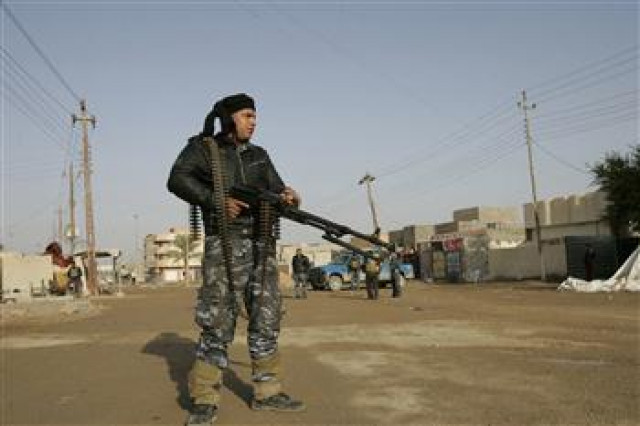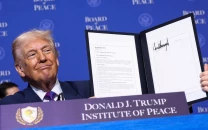Wave of attacks as gunmen storm Iraq police station
The coordinated blasts and shootings come with the country mired in a festering political row.

The coordinated blasts and shootings come with the country mired in a festering political row, and deal a blow to US and Iraqi officials' claims that domestic forces are able to maintain internal security.
Sunday's violence in mostly Sunni Ramadi came a day after a suicide attacker targeting Shia pilgrims killed 53 people on the outskirts of the southern city of Basra, the latest in a series of mass-casualty attacks that have killed nearly 200 people.
In Ramadi, two initial car bombs exploded at around 11:30 am (0830 GMT) near the Dawlah Kabir Mosque in central Ramadi, followed by a third car bomb also in the centre of the city, two police officers said on condition of anonymity.
A short while later, a fourth car bomb went off near a police building in Ramadi, followed quickly thereafter by two suicide bombers blowing themselves up inside the building.
Armed insurgents then stormed the building and clashes were ongoing as of 1:00 pm (1000 GMT), the police officers said.
The number of casualties was not immediately clear.
The violence was reminiscent of a siege at a police station in the nearby town of al Baghdadi, also in Anbar province, three months ago, in which the local police chief and four others were killed when gunmen disguised in police uniforms set off explosions, clearing the way for them to overrun the building.
Anbar was a key Sunni insurgent base in the years after the US-led invasion of 2003, but after 2006 local tribes sided with the American military against al Qaeda and day-to-day violence has dropped dramatically.
However Anbar, and particularly its capital Ramadi, has been the target of frequent attacks in previous years.
In June, at least three explosions near provincial government offices in Ramadi killed 10 people and wounded 15 others.
In January 2011, a suicide bomber blew up an explosives-packed car carrying Anbar governor Qassim Mohammed Abid, but he was unhurt.
Provincial government offices were also targeted by attackers three times in 2010, and, on December 30, 2009, Abid lost his left hand in a suicide attack that killed 23 people and wounded 30.
Sunday's attacks came less than a month after US troops completed their withdrawal from Iraq on December 18, leaving behind a security force that officials said was able to maintain internal security but not protect the country's borders, airspace or maritime territory.
The unrest also comes amid a political standoff in Iraq pitting the Shia-led government against the main Sunni-backed political bloc, stoking sectarian tensions.
Authorities have charged Sunni Arab Vice President Tareq al-Hashemi with running a death squad, and Prime Minister Nuri al-Maliki, a Shiite, has called for his Sunni deputy Saleh al-Mutlak to be sacked.
Hashemi denies the charges and has been holed up in the autonomous Kurdish region which has not handed him over.



















COMMENTS
Comments are moderated and generally will be posted if they are on-topic and not abusive.
For more information, please see our Comments FAQ